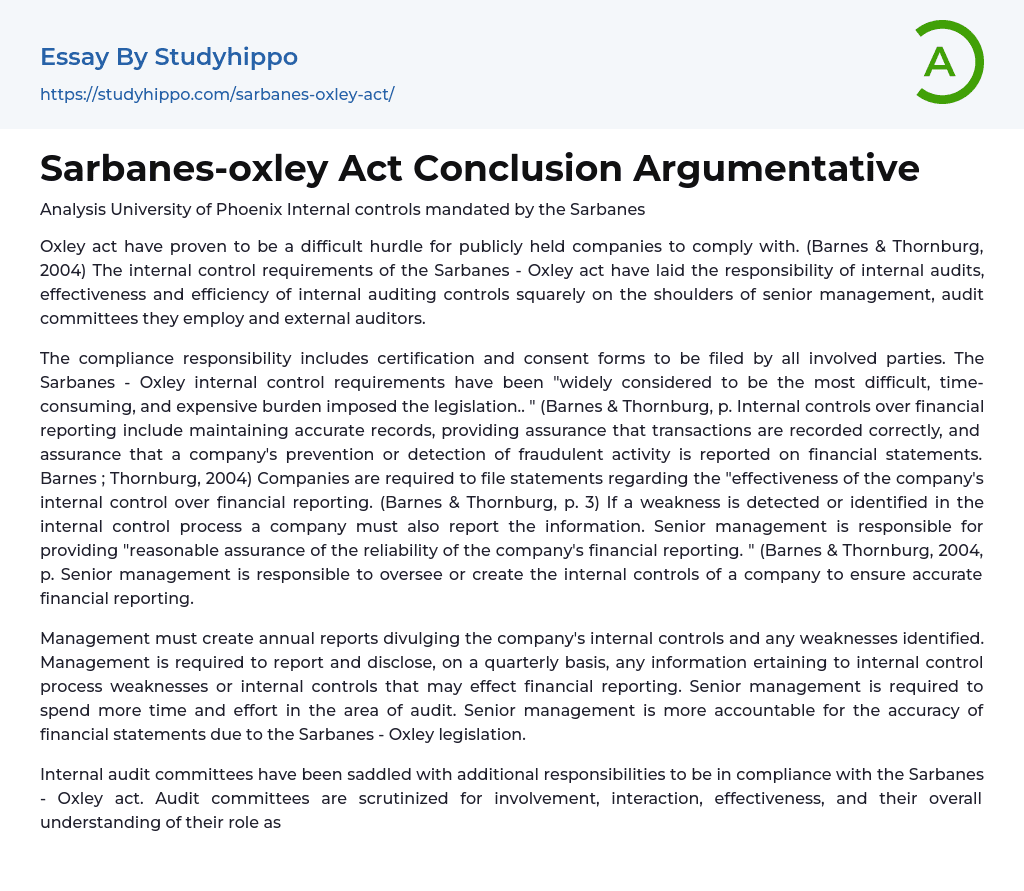

Sarbanes-oxley Act Conclusion Argumentative Essay Example
Analysis University of Phoenix Internal controls mandated by the Sarbanes
The internal controls required by the Sarbanes-Oxley Act have posed a significant challenge for publicly held companies. These controls assign the responsibility for internal audits, as well as evaluating the effectiveness and efficiency of internal auditing controls, to senior management, their audit committees, and external auditors. Compliance includes submitting certification and consent forms from all parties involved. The requirements for internal control under the Sarbanes-Oxley Act are widely regarded as the most difficult, time-consuming, and expensive burden imposed by this legislation.
(Barnes & Thornburg, p. Internal controls over financial reporting involve keeping accurate records and verifying the correct recording of transactions. They also provide assurance that a company's efforts to prevent or detect fraudulent activity are disclosed in financial statements. Barnes & T
...hornburg, 2004) Companies must submit reports on the effectiveness of their internal control over financial reporting. (Barnes & Thornburg, p.
3) In the event of discovering a weakness in the internal control process, a company is obligated to report this information. Senior management bears the responsibility of establishing "reasonable assurance of the reliability of the company's financial reporting" (Barnes ; Thornburg, 2004, p. Senior management must oversee or establish the internal controls of a company to guarantee accurate financial reporting. Furthermore, management is required to disclose the company's internal controls and any identified weaknesses in annual reports.
Under the Sarbanes-Oxley legislation, management is required to report and disclose any weaknesses in internal control processes or controls that could affect financial reporting every quarter. This law holds senior management responsible for ensuring the accuracy of financial statements, leading them to allocate mor
time and effort towards audits. To meet the requirements of the Sarbanes-Oxley act, internal audit committees have been given extra duties. The involvement, interaction, effectiveness, and overall comprehension of their role by these committees are closely scrutinized.
The duties of audit committees include appointing, compensating, retaining, and overseeing registered public accounting firms. These firms are responsible for preparing or issuing audit reports and conducting audits. The Sarbanes-Oxley legislation has also impacted the role of external auditors. Now, in addition to auditing financial statements, they must also audit a company's internal control. The relationship between senior management, audit committees, and external auditors has evolved, requiring communication with different levels of management.
Previously, senior management may not have dedicated time to reviewing company internal control measures. Although the new requirement is time-consuming and expensive, it has proven to be an effective tool in preventing fraud and ensuring accurate financial reporting. By assigning responsibility to multiple individuals within a company, all parties are compelled to give it proper attention.
- John Locke essays
- 9/11 essays
- A Good Teacher essays
- A Healthy Diet essays
- A Modest Proposal essays
- A&P essays
- Academic Achievement essays
- Achievement essays
- Achieving goals essays
- Admission essays
- Advantages And Disadvantages Of Internet essays
- Alcoholic drinks essays
- Ammonia essays
- Analytical essays
- Ancient Olympic Games essays
- APA essays
- Arabian Peninsula essays
- Argument essays
- Argumentative essays
- Art essays
- Atlantic Ocean essays
- Auto-ethnography essays
- Autobiography essays
- Ballad essays
- Batman essays
- Binge Eating essays
- Black Power Movement essays
- Blogger essays
- Body Mass Index essays
- Book I Want a Wife essays
- Boycott essays
- Breastfeeding essays
- Bulimia Nervosa essays
- Business essays
- Business Process essays
- Canterbury essays
- Carbonate essays
- Catalina de Erauso essays
- Cause and Effect essays
- Cesar Chavez essays
- Character Analysis essays
- Chemical Compound essays
- Chemical Element essays
- Chemical Substance essays
- Cherokee essays
- Cherry essays
- Childhood Obesity essays
- Chlorine essays
- Classification essays
- Cognitive Science essays



